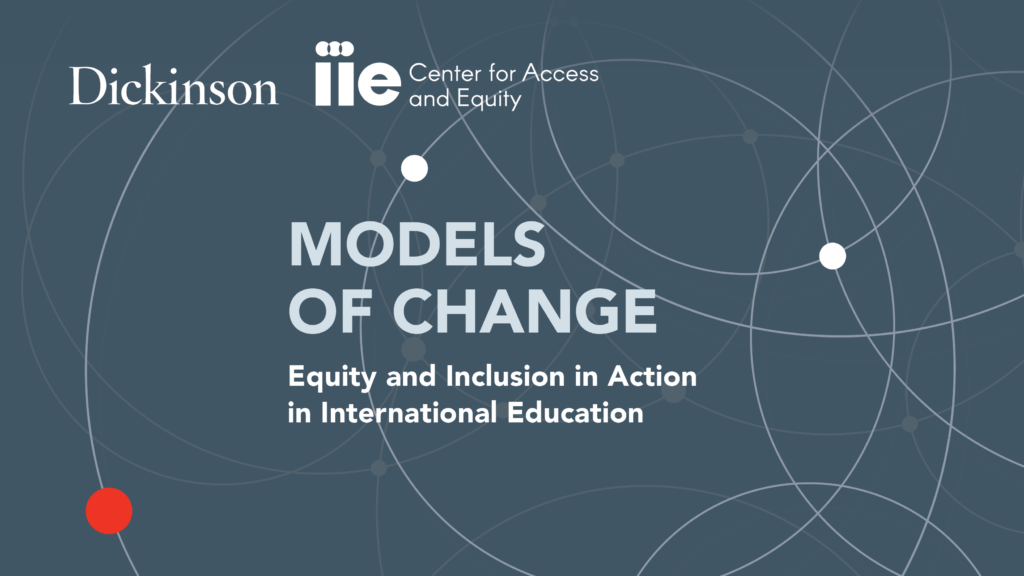Provides Tactics for De-Siloing Work and Implementing Change at Various Organizational Levels
October 26, 2023
IIE and Dickinson College today released a new, open-access publication offering insights and case studies about advancing DEIA in international higher education. Models of Change: Equity and Inclusion in Action in International Education collates and summarizes practical guidance for professionals seeking to build inclusive, equitable, and sustainable communities within their higher education institutions and among the populations they serve.
“We are building a strong community of practice for international and higher education professionals from around the world who are looking for meaningful ways to make inclusion and equity central to our shared work,” said Samantha Brandauer, Associate Provost and Executive Director of the Center for Global Study and Engagement at Dickinson College. “This joint publication fills me with hope as it highlights both the complexity of the project and pathways forward for us to build more inclusive, just, and sustainable communities.”
At about seventy pages — including four case studies — the publication is the culmination of three sets of IIE-Dickinson-led virtual workshops attended by nearly 300 leaders from more than 100 institutions and organizations in 10 countries. IIE and Dickinson’s leaders framed the workshops according to Dr. Kathryn Sorrells’ intercultural praxis model (IPM), which tasks individuals with exploring the intersection of cultural differences and hierarchies of power.
“In 2020, many of us were wondering, ‘What does the future of international education look like, and how can we support a positive outcome?’” Lindsay Gee Calvert, Director of the IIE Center for Access and Equity, writes. “For us, it was doubling down on our organizational commitment to our DEIA values and strategies. Knowing that we cannot work effectively in silos or in isolated capacities within and outside of our organization, we looked to a mutual partnership to expand our learning and sharing potential.”
The case studies come from a range of leaders and practitioners, including Monica Francioso, of CEA CAPA Education Abroad; Nedra Sandiford and Katie DeGuzman of Dickinson College; Julia Zeigler and Kapik Yeung of Brandeis University; and Lisa Miller, B. Dia Draper, and Vincent Mack of Dartmouth College. They align with the following themes:
- Self-awareness and an understanding of one’s own positionality and how it shifts across contexts are key components of this work. This process of self-inquiry is ongoing.
- The work of change toward more inclusion and equity can happen at different levels. The authors understand their spheres of influence and have started where they have the most ability to affect changes, even small, incremental ones. Small steps can have big ripple effects.
- This work is a process, and it is iterative. We need to be able to articulate what progress and growth look like in our context, garner lots of feedback, learn from our missteps, reflect, and then begin again. We need to keep asking, Who is missing? Who is not being heard?
- This work is most effective when done collectively. Part of our role is to build bridges to communities; with partners abroad, to our students; and to our colleagues across our institutions and organizations. We need to de-silo this work together and build communities of practice.
Models of Change is the first printed resource from the partnership, which IIE and Dickinson created in response to renewed calls for justice in 2020. The partnership leverages the strengths of both institutions with a common commitment to international education and a shared mission of building inclusive, equitable, and sustainable communities. Both institutions bring deep expertise and a global network that provides an opportunity to reimagine an international education framework that incorporates global, intercultural, and equity/inclusion lenses. To date, IIE and Dickinson have led three sets of virtual workshops: Moving from Inclusivity Talk to Equity in Action in International Education Leadership (2020–21), Building Bridges: Committing to Global Equity and Justice in International Education (2022), and How Do You Know You Are Meeting Your Global DEI Outcomes? Assessing and Communicating Impact (2022).
To codify and expand its DEIA Commitment in the international education field, IIE announced the all-new IIE Center for Equity and Access in March 2023. In July 2023, the Center’s IIE American Passport Project — a grant aiming to assist 10,000 Pell-eligible U.S. students to obtain U.S. passports to study abroad by the end of the decade — received a 2023 AAUA Khaladjan International Award for Innovation in Higher Education.
About the IIE Center for Access and Equity
The IIE Center for Access and Equity aims to advance accessible programming and equitable practices in community building that enrich and expand international education, exchange, and opportunity for all. Through dialogue and action, the Center leverages programs and partnerships that examine the intersection of international education with diversity, equity, inclusion, and access; cultivates global learning to support engagement and understanding of individuals and communities; and supports access for underrepresented communities by examining and addressing structural inequities. Learn more at www.iie.org/CAE.
About Dickinson College
Dickinson College is a long-recognized and award-winning leader in global education and study abroad with unique strengths at the intersection of global and intercultural learning and diversity, equity and inclusion. Dickinson is a nationally recognized liberal-arts college chartered in 1783 in Carlisle, Pennsylvania. The highly selective college is home to more than 2,100 students from across the nation and around the world. Dickinson has developed an international reputation for our commitment to imbuing our students with an immersive global perspective, a holistic sustainability education, a community orientation and civic skillset, and the ability to think across disciplines and dialogue across differences. Through these interdependent dimensions of a Dickinson education, students are better able to connect their values to their career and civic goals. Our alumni are out in the world building more just, equitable, sustainable and prosperous communities. Learn more at Dickinson.edu.
